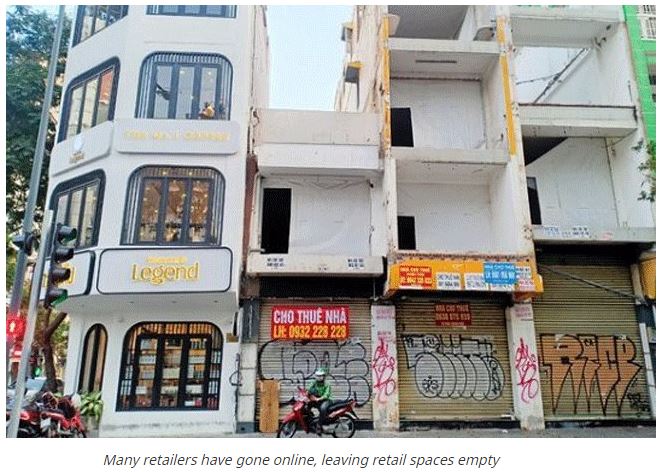Vietnam: Retail spaces left empty as shops go online
Although Vietnam has managed to effectively contain the Covid-19 outbreak, many unsuccessful shops have shut down, as retailers have opted to go online to reduce operation costs, with the trend expected to grow further in the coming time.
According to the latest report by Savills Vietnam, HCMC has seen a soaring number of retail spaces at street houses for lease, while the rate of occupancy has been slowing down. Many spaces at key business streets such as Ho Tung Mau, Ngo Duc Ke, Le Loi and Pham Ngu Lao in District 1 also remain unoccupied.
Customers in the food & beverage and fashion sectors have reduced leasing spaces and even returned premises to owners to cut operation costs. Data of the HCMC Department of Statistics showed that revenue from the food & beverage service segment in the January-September period slumped by 39% compared with the same period last year.
Meanwhile, the booming e-commerce segment has continued adversely impacting traditional retail revenue.
Nielsen in July announced that 64% of consumers would keep using delivery services, while 63% would opt for online shopping. The number of online shoppers accessing e-commerce websites would surge in the future.
Vo Khanh Trang, head of the research department of Savills Vietnam, said that the challenges facing the street house segment could be due to the positivity of owners, who had believed in a market recovery and decided to keep rentals intact.
Meanwhile, businesses have continued closing shops, reducing store sizes or shifting their operations online. At locations that suffer lower footfall and depend largely on tourists, retailers have decided to leave although their owners accepted cutting rents in the short term.
New customers in the segment remain relatively cautious and the situation is likely to stay the same in the time to come. However, traditional retail activities may revive as important festivals and the traditional Lunar New Year holidays are approaching, said the Savills representative.
Meanwhile, shopping centers fared better as they saw a milder impact from the two Covid-19 outbreaks in the January-September period. In the third quarter, the occupancy rate dropped 1% compared with the last quarter of 2019, but it remained high at 95%. The average rental remained almost unchanged.
The control over the second wave of the Covid-19 pandemic and high occupancy rate helped strengthen market confidence, noted Trang of Savills.
SGT
Source: https://vietnamnet.vn/en/business/retail-spaces-left-empty-as-shops-go-online-688773.html


 Thailand
Thailand




